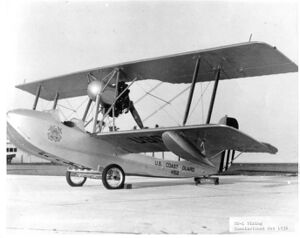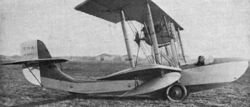Engineering:FBA 17
| Type 17 | |
|---|---|

| |
| Viking OO-1 in USCG service | |
| Role | Flying boat trainer |
| Manufacturer | FBA |
| Designer | Louis Schreck |
| First flight | April 1923 |
| Number built | >300 |
The FBA 17 was a training flying boat produced in France in the 1920s.
Design and development
Similar in general layout to the aircraft that FBA had produced during World War I, the Type 17 was a conventional two-bay biplane with unequal-span, unstaggered wings and side-by-side open cockpits. The pusher engine was mounted on struts in the interplane gap. Apart from their use by the French Navy, a small number were sold to the Polish Navy, the Brazilian Air Force , and civil operators as well. Some versions were built as amphibians, and others had fittings to allow them to be catapulted from warships.
In 1931, the US Coast Guard purchased an example for evaluation, and being pleased with the design, arranged for the type to be built under licence by the Viking Flying Boat Company in New Haven, Connecticut. Six aircraft were eventually produced and served with the Coast Guard under the designation OO until the outbreak of World War II.
Variants
- 17 HE.2
- (Hydravion d'École) 2-seat trainer, Hispano-Suiza 8A-powered, (over 300 built).
- 17 HL.1
- (Hydravion de Liaison) 1-seat catapulatable liaison aircraft, Hispano-Suiza 8A-powered, (1 built)
- 17 HL.2
- 2-seat catapultable liaison aircraft, Hispano-Suiza 8A-powered, (10 built)
- 17 HMT.2
- (Hydravion Mixte de Transport) 2-seat amphibious transport aircraft, Hispano-Suiza 8A-powered, (37 built)
- A FBA-17HMT2 plane called Lubliniak, was bought by the Airborne and Antigas Defence League (LOPP) with was funds donated by the readers of Głos Lubelski, for use in propaganda flights across central and eastern Poland.[1]
- 17 HMB.2
- 17 HMT 2s already in service with the French Navy, were redesignated HMB 2, after being fitted with a bomb rack on the port side of the hull.
- 17 HMT.4
- 4-seat amphibious transport aircraft, Hispano-Suiza 8A-powered, (2 built)
- 17 HT.4
- (Hydravion de Transport) 4-seat transport aircraft, Hispano-Suiza 8A-powered, (35 built)
- 171 HE.2
- 2-seat trainer, Lorraine Mizar-powered, (1 built).
- 172 HE.2
- 2-seat trainer, Gnome et Rhône 5B-powered, (5 built).
- 172 HMT.2
- 2-seat amphibious transport aircraft, Gnome et Rhône 5B-powered, (1 built).
- 172 HT.4
- 4-seat transport aircraft, Gnome et Rhône 5B-powered, (1 built).
- 172/2
- The HT.4 was redesignated Type 172/2, Gnome et Rhône 5B-powered, after it was fitted with extra fuel tanks.
- Viking V-2
- French-built HT.4s converted to 2-seaters (4 converted)
- Viking OO-1
- longer-span, Wright R-760-powered version of V-2 produced for USCG (5 built)
Operators
 Brazil
Brazil
- Brazilian Air Force
- Brazilian Naval Aviation
 France
France
- French Navy
 Poland
Poland
- Polish Navy
 United States
United States
- United States Coast Guard
Specifications (17 HE.2)
Data from Jane's all the World's Aircraft 1928,[2] Aviafrance:F.B.A. 17 HE.2[3]
General characteristics
- Crew: 2
- Length: 8.94 m (29 ft 4 in)
- Wingspan: 12.87 m (42 ft 3 in)
- Height: 3.2 m (10 ft 6 in)
- Wing area: 36.5 m2 (393 sq ft)
- Empty weight: 850 kg (1,874 lb)
- Gross weight: 1,150 kg (2,535 lb)
Performance
- Maximum speed: 162 km/h (101 mph, 87 kn)
- Landing speed: 80 km/h (50 mph; 43 kn)
- Range: 360 km (220 mi, 190 nmi)
- Service ceiling: 5,000 m (16,000 ft)
- Time to altitude: 2,000 m (6,600 ft) in 9 minutes; 3,000 m (9,800 ft) in 17 minutes 30 seconds
- Wing loading: 31.5 kg/m2 (6.5 lb/sq ft)
- Power/mass: 0.1166 kW/kg (0.0709 hp/lb)
See also
Related lists
References
- ↑ "Zbiory NAC on-line". Zbiorów NAC. https://audiovis.nac.gov.pl/obraz/60780/.
- ↑ Grey, C.G., ed (1928). Jane's all the World's Aircraft 1928. London: Sampson Low, Marston & company, ltd. pp. 102c–103c.
- ↑ Parmentier, Bruno (10 December 1998). "F.B.A. 17 HE 2" (in fr). Paris. https://www.aviafrance.com/aviafrance1.php?ID=730&ID_CONSTRUCTEUR=491&ANNEE=0&ID_MISSION=0&MOTCLEF=.
- Pearcy, Arthur (1991). U.S. Coast Guard Aircraft Since 1916. Shrewsbury, UK: Airlife Publishing Ltd.. ISBN 1-85310-118-4.
Further reading
- Bousquet, Gérard (2013). French Flying Boats of WW II. Sandomierz, Poland: Stratus. ISBN 978-83-63678-06-7.
- Cortet, Pierre (September 2000). "Rétros du Mois" (in fr). Avions: Toute l'Aéronautique et son histoire (90): 4. ISSN 1243-8650.
- Morareau, Lucien (December 1998). "L'escadrille du bout du monde" (in fr). Avions: Toute l'Aéronautique et son histoire (69): 42–51. ISSN 1243-8650.
- Nelcarz, Bartolomiej; Peczkowski, Robert (April 2000). "Les appareils français dans la Marine Polonaise" (in fr). Avions: Toute l'Aéronautique et son histoire (85): 22–27. ISSN 1243-8650.
- Nelcarz, Bartolomiej; Peczkowski, Robert (2001). White Eagles: The Aircraft, Men and Operations of the Polish Air Force 1918–1939. Ottringham, UK: Hikoki Publications. ISBN 1-902109-73-2.
- Taylor, Michael J. H. (1989). Jane's Encyclopedia of Aviation. London: Studio Editions. pp. 382.
External links
- Parmentier, Bruno (10 December 1998). "F.B.A. 17 HL 1" (in fr). Paris. https://www.aviafrance.com/aviafrance1.php?ID=5654&ID_CONSTRUCTEUR=491&ANNEE=0&ID_MISSION=0&MOTCLEF=.
- Parmentier, Bruno (10 December 1998). "F.B.A. 17 HL 2" (in fr). Paris. https://www.aviafrance.com/aviafrance1.php?ID=5655&ID_CONSTRUCTEUR=491&ANNEE=0&ID_MISSION=0&MOTCLEF=.
- Parmentier, Bruno (10 December 1998). "F.B.A. 17 HMT 2" (in fr). Paris. https://www.aviafrance.com/aviafrance1.php?ID=727&ID_CONSTRUCTEUR=491&ANNEE=0&ID_MISSION=0&MOTCLEF=.
- Parmentier, Bruno (10 December 1998). "F.B.A. 17 HMT 4" (in fr). Paris. https://www.aviafrance.com/aviafrance1.php?ID=5653&ID_CONSTRUCTEUR=491&ANNEE=0&ID_MISSION=0&MOTCLEF=.
- Parmentier, Bruno (10 December 1998). "F.B.A. 17 HT 4" (in fr). Paris. https://www.aviafrance.com/aviafrance1.php?ID=728&ID_CONSTRUCTEUR=491&ANNEE=0&ID_MISSION=0&MOTCLEF=.
- Parmentier, Bruno (10 December 1998). "F.B.A. 171 HE 2" (in fr). Paris. https://www.aviafrance.com/aviafrance1.php?ID=5656&ID_CONSTRUCTEUR=491&ANNEE=0&ID_MISSION=0&MOTCLEF=.
- Parmentier, Bruno (10 December 1998). "F.B.A. 172 HE 2" (in fr). Paris. https://www.aviafrance.com/aviafrance1.php?ID=5657&ID_CONSTRUCTEUR=491&ANNEE=0&ID_MISSION=0&MOTCLEF=.
- Parmentier, Bruno (10 December 1998). "F.B.A. 172 HMT 2" (in fr). Paris. https://www.aviafrance.com/aviafrance1.php?ID=5658&ID_CONSTRUCTEUR=491&ANNEE=0&ID_MISSION=0&MOTCLEF=.
- Parmentier, Bruno (10 December 1998). "F.B.A. 172 HT 4" (in fr). Paris. https://www.aviafrance.com/aviafrance1.php?ID=5659&ID_CONSTRUCTEUR=491&ANNEE=0&ID_MISSION=0&MOTCLEF=.
- "FBA 17" (in ru). http://www.airwar.ru/enc/flyboat/fba17.html.
- Hartmann, Gérard (15 May 2000). "Le FBA type 17 (1923-1931)" (in fr). http://www.hydroretro.net/etudegh/fbatype17.pdf.
- "American airplanes: U - V". 17 April 2009. http://aerofiles.com/_uv.html#_V.
 |



